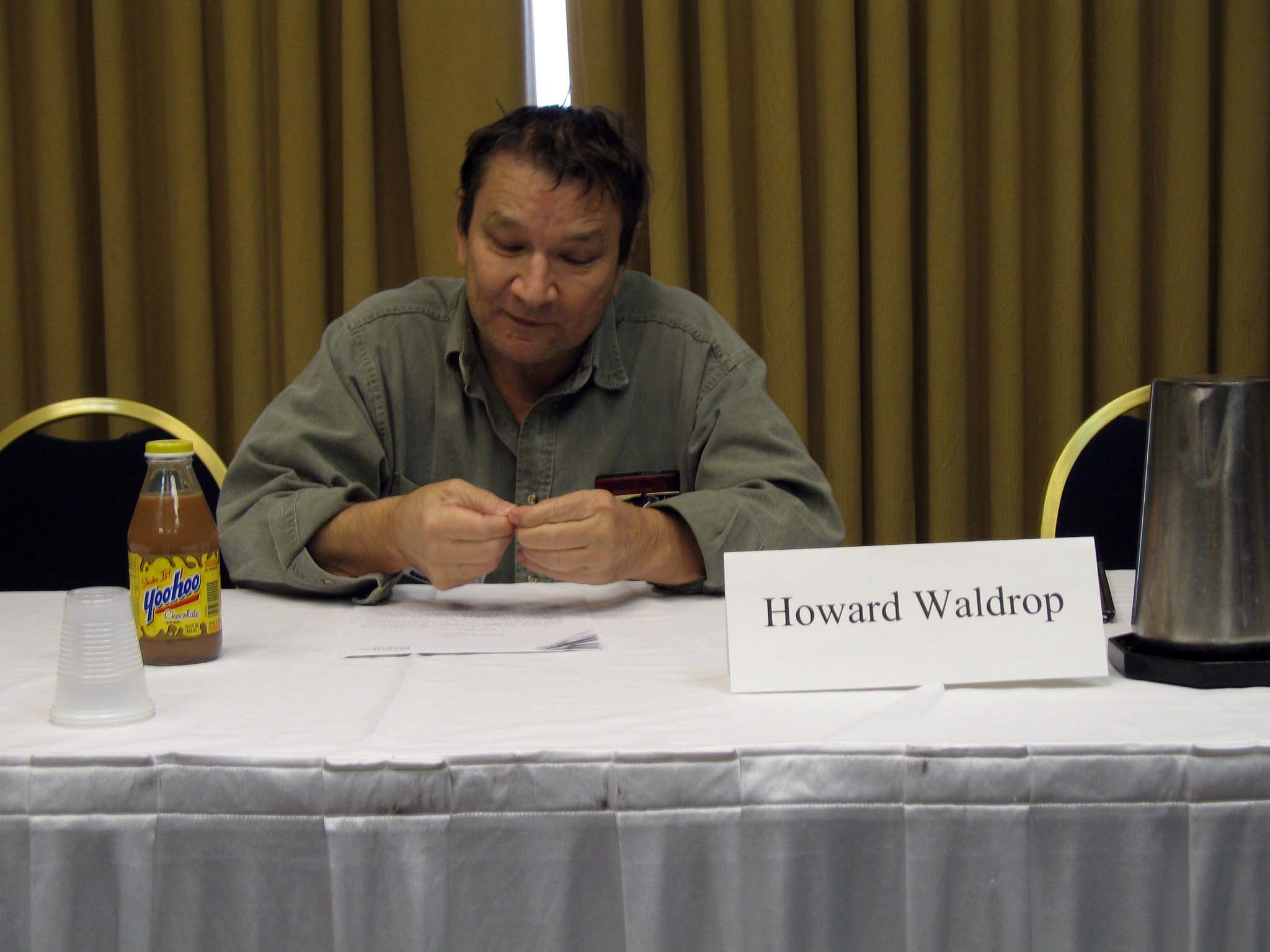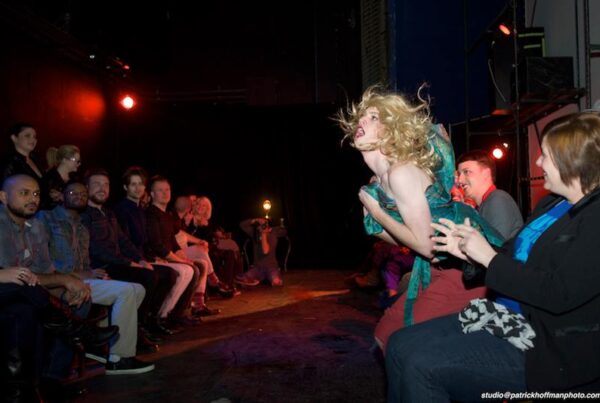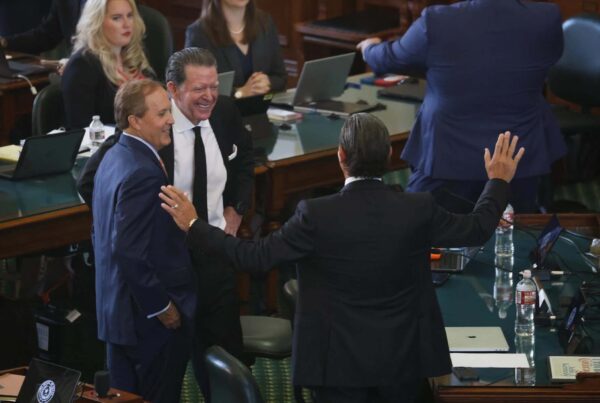Author Howard Waldrop died earlier this week at 77. In more than 40 years as a writer of short science fiction, he became popular with fans and other writers for his stories of the natural world, alternative history, and of Texas, his adopted home state.
Waldrop won a Nebula Award for one of his best-known works, “The Ugly Chickens,” and he received the World Fantasy Award for Short Fiction in 1981.
Author Joe R. Lansdale knew Waldrop well, as both a friend and a collaborator. He says Waldrop’s interest in the unusual, and his curiosity about the world, informed his work. Listen to the interview above or read the transcript below.
This transcript has been edited lightly for clarity:
Texas Standard: Howard Waldrop was known as a science fiction writer, but I’m wondering if you can tell us more about what that means in his specific case. What sort of stories interested him as a writer?
Joe Lansdale: I think he was more of a speculative fiction writer. I mean, he wasn’t doing hard science. What he liked to do was take two things that did not seem to fit together and turn them into a story, or take ideas that were somewhat outre and make them seem very natural.
One of them being like “The Ugly Chickens,” where an anthropologist discovers that dodos are still alive. And I won’t ruin the story for anybody, but it’s just little things like that he would jump off of. Or where you have an alternate history where [former president Dwight] Eisenhower worked in a swing band. And things like that.
So he was a very interesting writer. And I adapted one of his stories, actually, to a film, called “Night of the Cooters,” which took “The War of the Worlds” from H.G. Wells and put it out in West Texas.
It was sort of from the perspective of a rural sheriff, as I recall. Very fascinating and fun – that was a big part of his writing. Even if you had trouble making the leap to some of the more preposterous outlines of the tale, it was hard to put down some of his writing. And I know you and Howard were both part of what’s been called the Texas school of science fiction.
Yeah, I think that’s right. I mean, there were people that were closer to Howard than me, but I’ve known him for a long time. But me and Neal Barrett and Lewis Shiner and so many others were part of a loose group – we’re all from Texas, or lived in Texas and we wrote speculative fiction or odd fiction or what-have-you.
And so we sort of overlapped and knew each other, and I think it inspired one person to do one thing and then another person to do another. But I think there was that influence. I had a little less because I didn’t live in Austin, and a bunch of these people all lived in that Austin area.
Do you think that that Texanness, other than the subject matter, obviously, came out in the writing?
Yeah, I think so. it’s hard to explain why. And, you know, people would say there must be something in the water there, but I think it goes back to the penchant for telling tall tales and for hearing them when you’re growing up.
Especially the older generation – I mean, we were still hearing tales of Davy Crockett and stuff when we were growing up. And so I think a lot of that kind of welded itself into the stories. I think it’s very true that it’s a Texas attitude that sort of forms him.
» GET MORE NEWS FROM AROUND THE STATE: Sign up for Texas Standard’s weekly newsletters
As a young person, Waldrop famously had a pen pal relationship with ‘Game of Thrones’ author George R.R. Martin. How did he talk about that connection, and how do you think that relationship affected Howard’s work?
He and Howard – I think you could call them best friends. I don’t know that it affected it so much that they traded ideas, but they were very close friends. They were comic book collectors. They were in the early science fiction fandom. And so they were constantly in contact.
And I’m sure that the excitement of being young – we were all that way. We were all excited to be writing and to be writing an unusual type of fiction. Science fiction at that time was not as accepted as it is now. And I think a lot of tremendous work on both sides.
I know you and Howard collaborated on a project fairly recently. You were also longtime friends. Can you give us a sense of who Howard Waldrop was, the person who wrote these stories?
Well, he was kind of a walking encyclopedia of stories, and who wrote what and where it appeared in television shows and who was in them – I mean, a lot of really obscure stuff that nobody needed to know, Howard knew it.
I guess that would really be a wonderful tool if you’re trying to be speculative about history or thinking of alternative history. You think about: What’s really possible here?
Right? Howard was a slow writer. He didn’t write a lot, and he was never gigantically successful, which is unfortunate. And I think it’s probably because he wrote mostly short stories. And a lot of us wrote short stories. I’m a big short story writer, but I also wrote novels.
Howard wrote maybe two novels, possibly three. And I think that kept him from being known as well as he should have. But he was always churning with ideas, and it just took him a long time to formulate them and put them down.
Well, he was certainly known among other writers. I think he’s sometimes been called a writer’s writer, which is quite the compliment from one’s colleagues. What does that accolade mean to you when you think about Waldrop’s work and how he related with other writers?
Well, you want the general audience to like your work, but I think there is something special about the idea that you’re writing something that your peers really get and really understand and really appreciate, because I think that ultimately you want to be able to say, “look, I want to write something unusual, but I want it to be appreciated by other people who write unusual things.”
So it’s not just passé or the same old stuff. So I believe that that’s what is meant by a writer’s writer. It’s a writer who looks at another writer and says, “I wish I could do that,” or “maybe I can learn to do that.”
For folks who don’t know Howard Waldrop work or they’ve just heard the name, what might you recommend in terms of a story or a book that they should check out?
Well, there’s a volume called “Night of the Cooters,” which is the title of a short story, but it contains other stories. And there’s another one called “Howard Who?” But there are recently some more collections that are mixing his best stories together, and those would probably be another couple of things to seek out, because I think there’s like a couple of volumes.
A lot of his short stories were published for a while. But you have a hard time finding some of his work. Could you say a little bit about why that is? Was he not well accepted among certain elites in the publishing industry, or was there something else?
I don’t think that was it. I think it’s just that he wrote so little and that so much time would go between stories. And then I think short stories have a hard time reaching a larger audience. And I think that’s truer and truer as time goes on – people were not as likely to come across one of his stories.
And I don’t think they were reprinted as much as one would think. And I think a lot of that was Howard. Howard just was not real good about handling his career. He just wanted to write. He wasn’t worried about the business.
What do you think drove that passion?
I think it’s that creative passion that a lot of writers have, that all of us who write have. It’s just that we start out early, being interested in this sort of thing, and we say, “gee, I hope I can do that.” And then we start doing it.
And some of us have better careers. And others, even if the other person might even be a better writer … It’s just, you never know. But I think it’s the drive. I think it’s that “I got a creative spark. I have to find some way to express it.”
Joe, as a friend, how will you remember Howard?
I think just being jokey and being fun to talk to. We would just talk about old science fiction and old films. I think we were trying to one-up one another, and I usually got one-upped.















